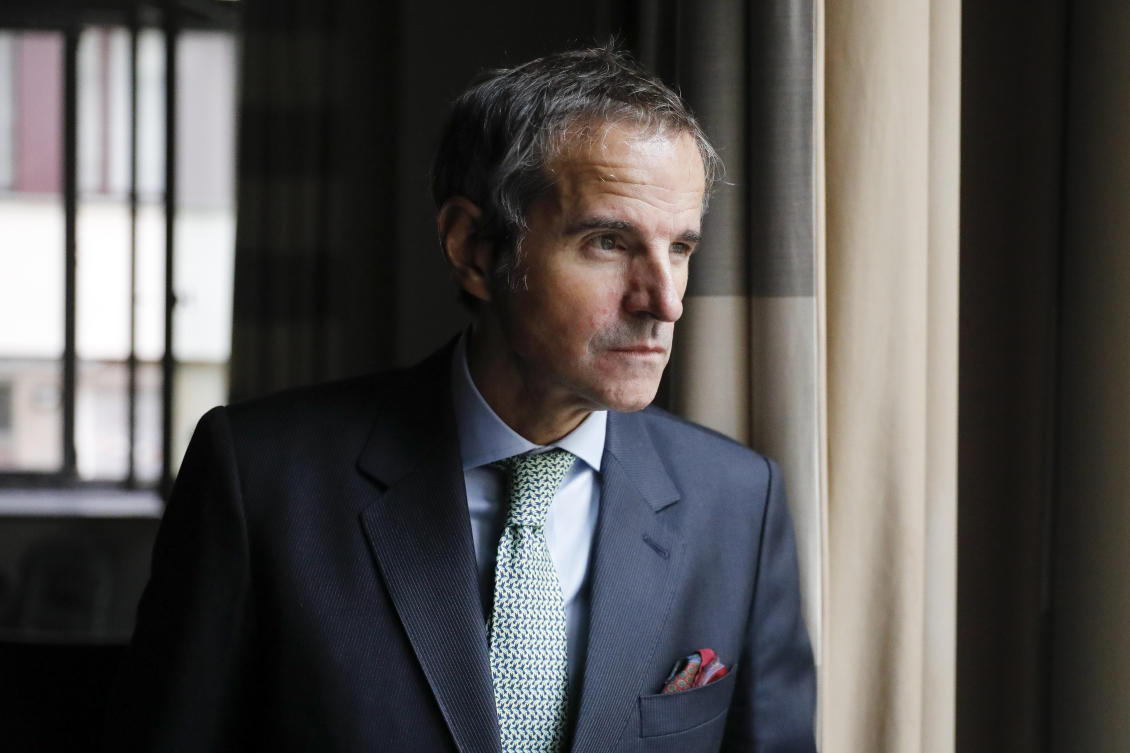BERLIN: Inspectors from the UN’s atomic watchdog have confirmed Iran has started building an underground centrifuge assembly plant after its previous one exploded in what Tehran called a sabotage attack over the summer, the agency’s head told The Associated Press on Tuesday.
Iran also continues to stockpile greater amounts of low-enriched uranium, but does not appear to possess enough to produce a weapon, Rafael Grossi, director-general of the International Atomic Energy Agency, told the AP in an interview in Berlin.
Following the July explosion at the Natanz nuclear site, Tehran said it would build a new, more secure, structure in the mountains around the area. Satellite pictures of Natanz analyzed by experts have yet to show any obvious signs of construction at the site in Iran’s central Isfahan province.
“They have started, but it’s not completed,” Grossi said. “It’s a long process.”
He would not give further details, saying it’s “confidential information.” Iran’s mission to the United Nations did not immediately respond to a request for comment.
Ali Akbar Salehi, the head of Iran’s nuclear department, last month told state television the destroyed above-ground facility was being replaced with one “in the heart of the mountains around Natanz.”

Rafael Mariano Grossi, Director General of International Atomic Energy Agency (IAEA), said Iran also continues to stockpile greater amounts of low-enriched uranium. (AP)
Natanz hosts the country’s main uranium enrichment facility. In its long underground halls, centrifuges rapidly spin uranium hexafluoride gas to enrich uranium.
Natanz became a flashpoint for Western fears about Iran’s nuclear program in 2002, when satellite photos showed Iran building an underground facility at the site, some 200 kilometers (125 miles) south of the capital, Tehran. In 2003, the IAEA visited Natanz, which Iran said would house centrifuges for its nuclear program, buried under some 7.6 meters (25 feet) of concrete. That offers protection from potential airstrikes on the site, which also is guarded by anti-aircraft positions.
Natanz had been targeted by the Stuxnet computer virus previously, which was believed to be a creation of the US and Israel. Iran has yet to say who it suspects of carrying out the sabotage in the July incident. Suspicion has fallen on Israel as well, despite a claim of responsibility by a previously unheard-of group at the time.
Under the provisions of the landmark 2015 nuclear deal with world powers known as the Joint Comprehensive Plan of Action, Iran is allowed to produce a certain amount of enriched uranium for non-military purposes.
In return, Iran was offered economic incentives by the countries involved.
Since President Donald Trump pulled the US unilaterally out of the deal in 2018 and re-imposed sanctions, however, the other signatories — Germany, France, Britain, Russia and China — have been struggling to keep the deal alive.
Meanwhile, Iran has been steadily exceeding the deal’s limits on how much uranium it can stockpile, the purity to which it can enrich uranium and other restrictions to pressure those countries to come up with a plan to offset US sanctions.
Still though, Iran has continued to allow IAEA inspectors full access to its nuclear facilities, including Natanz, Grossi said.
In the latest IAEA quarterly report, the agency reported Iran as of Aug. 25 had stockpiled 2,105.4 kilograms (4,641.6 pounds) of low-enriched uranium, well above the 202.8 kilograms (447.1 pounds) allowed under the JCPOA. It was also enriching uranium to a purity of 4.5%, higher than the 3.67% allowed under the deal.
In the next report, due in coming weeks, Grossi said: “We continue to see the same trend that we have seen so far.”
According to a widely cited analysis by the Washington-based Arms Control Association, Iran would need roughly 1,050 kilograms (1.16 tons) of low-enriched uranium — under 5% purity — in gas form and would then need to enrich it further to weapons-grade, or more than 90% purity, to make a nuclear weapon.
The IAEA’s current assessment is, however, that Iran does not at the moment possess a “significant quantity” of uranium — defined by the agency as enough to produce a bomb — according to Grossi.
“At the moment, I’m not in contact with my inspectors, but by memory, I wouldn’t say so,” he said.
“All of these are projections and the IAEA is not into speculation” he added. “What may happen? What could happen? We are inspectors, we say the amounts that we see.”
Iran insists it has no interest in producing a bomb, and Grossi noted that before the JCPOA, Iran had enriched its uranium up to 20% purity, which is just a short technical step away from the weapons-grade level of 90%. And in 2013, Iran’s stockpile of enriched uranium was already more than 7,000 kilograms (7.72 tons) with higher enrichment, but it didn’t pursue a bomb.
“The idea of a ‘significant quantity’ is a technical parameter ... that applies in the context of the safeguards agreement to indicate amounts which could be theoretically used for the development of a nuclear weapon,” he said.
“The fact that there could be such an amount would not indicate automatically that a nuclear weapon is being fabricated, so I think we have to be very careful when we use these terms.”
Grossi personally visited Tehran in late August for meetings with top officials, and managed to break a months-long impasse over two locations thought to be from the early 2000s where Iran was suspected of having stored or used undeclared nuclear material and possibly conducted nuclear-related activities.
Inspectors have now taken samples from both of those sites, and Grossi said they are still undergoing lab analysis.
“It was a constructive solution to a problem what we were having,” he said. “And I would say since then we have kept the good level of cooperation in the sense that our inspectors are regularly present and visiting the sites."
















